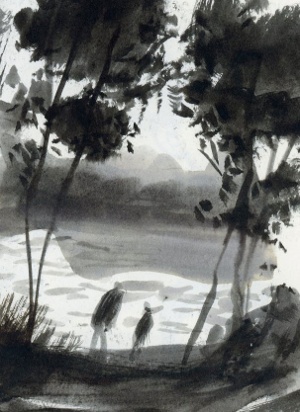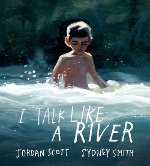I Talk like a River is a book made of many things and made by many hands. But at its core its main ingredients are love and acceptance. Having illustrated this book, I can say with confidence that it was the purest and most positive collaborative experience in my book-making life.
 I Talk like a River is a book made of many things and made by many hands. But at its core its main ingredients are love and acceptance. Having illustrated this book, I can say with confidence that it was the purest and most positive collaborative experience in my book-making life.
I Talk like a River is a book made of many things and made by many hands. But at its core its main ingredients are love and acceptance. Having illustrated this book, I can say with confidence that it was the purest and most positive collaborative experience in my book-making life.
Our editor, Neal Porter, introduced me to Jordan Scott’s text before we met in person. Jordan’s story was beautiful, vulnerable, honest, and sincere. I knew right away that we would become friends. I felt encouraged to explore an artistic approach that was new and exciting. There was never any lack of encouragement to take risks and dive into the depths of the text to explore the universal nature of the character and his story. I was unfettered. If there is an opportunity to thank anyone, it would be Neal Porter and Jordan Scott, my collaborators, and our home Holiday House. Also, a big thank you to Roger Sutton, the Horn Book, and specifically the judges of this prize. The personal significance of the Boston Globe–Horn Book Award is boundless.
[Read Horn Book reviews of the 2021 BGHB Picture Book winners.]
Having had the privilege of both collaborating on picture books and going solo, I have learned that there are benefits to both, but the results of collaboration can be far more satisfying. The fact that collaboration is not a singular vision, but instead an aggregate, allows me to say what I truly think of this book without fear of sounding self-congratulatory.
I can say that this is a great book. This is a beautiful book. This is a book that I will forever hold up and share because it is not a book that was crafted for maximum sales; or shelf appeal; or shares, likes, or tweets. It is a book that does not need to be loved and accepted. Instead, it offers love and acceptance. It exists to listen, and to hear the voices of those who are afraid to speak.
This book has only a few characters. The boy, who struggles with disfluency; the faceless classmates at school, who amplify his condition and anxiety; and the father, who takes the boy to the river after school for a quiet walk. The father shares a simple observation that triggers a revelatory moment. “See how that water moves? That’s how you speak,” he says.
That’s it. It’s not much, but the book relies on the father speaking these words.

Sketch from I Talk like a River. Sketch: Sydney Smith.
I often think about the role of the father in this book. As a father of two boys (as is Jordan), I have transitioned as a reader from relating only to the child characters in books to sympathizing with any parents when they show up in stories. I loved Calvin and Hobbes when I was young, swearing a blood oath to be buried with my collection, and always connected to Calvin as he modeled and promoted an unbridled — if destructive — imagination. Never had I considered the role of his parents beyond that of a foil or an obstruction (or at all). It was a sad day when I picked up a Calvin and Hobbes book and thought, “He really is a handful.” I had tipped over to the other side. I was now the frustrated parent and the unhinged child.
 When I illustrated that moment between the father and son in I Talk like a River, I empathized with both characters equally. I felt the helplessness of the father, wanting to help, wanting to say something to make everything better. And I felt the frustration, shame, and anger that the boy carried for himself.
When I illustrated that moment between the father and son in I Talk like a River, I empathized with both characters equally. I felt the helplessness of the father, wanting to help, wanting to say something to make everything better. And I felt the frustration, shame, and anger that the boy carried for himself.
Although some see the transformative moment when the father says his words as a moment of sage wisdom and acute sensitivity, I prefer to believe that the father (like me, most days) had no idea what he was doing. He said something that came to his head, unaware that the words he spoke would be said at just the right moment, in just the right way, to be heard and processed to create a life-changing shift in how his son saw himself. What he said was, “That’s how you speak.” What the boy heard was, “You are not broken. You do not exist outside the natural world. Fluency is an illusion. You are as beautiful as the river that bubbles and swirls and crashes and flows.” All of this may be what the father truly felt, but had he said all of that, I think the boy would have shrugged it off, as would the reader, and the impact of the book would have been lessened.
Perhaps what’s more important than the words the father spoke was the quiet and safe space that he provided. The boy, in the calm silence, was free of the pressure to fix everything. Not to be pushed into a radical self-acceptance or subjected to armchair speech pathology, but instead allowed to be silent and to be heard when he wished to speak. They were just two people having a stroll. Not teacher and student, not doctor and patient, but two people, enjoying the silence.
As creators of picture books, we are in a similar position to the father. We all work hard to create a connection and manufacture a moment of clarity for our young readers. With our help they might access emotions and further understand themselves. But in all our attempts to inform, provide, and guide, it is not up to us. The best we can do is be present, provide a space of understanding, and occasionally mutter a few thoughtful observations. The truth is, the moment of clarity is not ours to be given. If the moment happens, it will happen far from us and not on our time. If we are lucky, our mutterings will be heard at just the right moment by just the right person, but it will be done on their terms, when they are ready. And in that special moment, the words they need to hear will not be ours anymore.
It will not be our voice they hear; it will be their own.
From the January/February 2022 issue of The Horn Book Magazine. Read author Jordan Scott's BGHB speech here. For more on the 2021 Boston Globe–Horn Book Awards, click on the tag BGHB21. Read more from The Horn Book by and about Sydney Smith.


 I Talk like a River is a book made of many things and made by many hands. But at its core its main ingredients are love and acceptance. Having illustrated this book, I can say with confidence that it was the purest and most positive collaborative experience in my book-making life.
I Talk like a River is a book made of many things and made by many hands. But at its core its main ingredients are love and acceptance. Having illustrated this book, I can say with confidence that it was the purest and most positive collaborative experience in my book-making life.
 When I illustrated that moment between the father and son in I Talk like a River, I empathized with both characters equally. I felt the helplessness of the father, wanting to help, wanting to say something to make everything better. And I felt the frustration, shame, and anger that the boy carried for himself.
When I illustrated that moment between the father and son in I Talk like a River, I empathized with both characters equally. I felt the helplessness of the father, wanting to help, wanting to say something to make everything better. And I felt the frustration, shame, and anger that the boy carried for himself.




Add Comment :-
Be the first reader to comment.
Comment Policy:
Comment should not be empty !!!